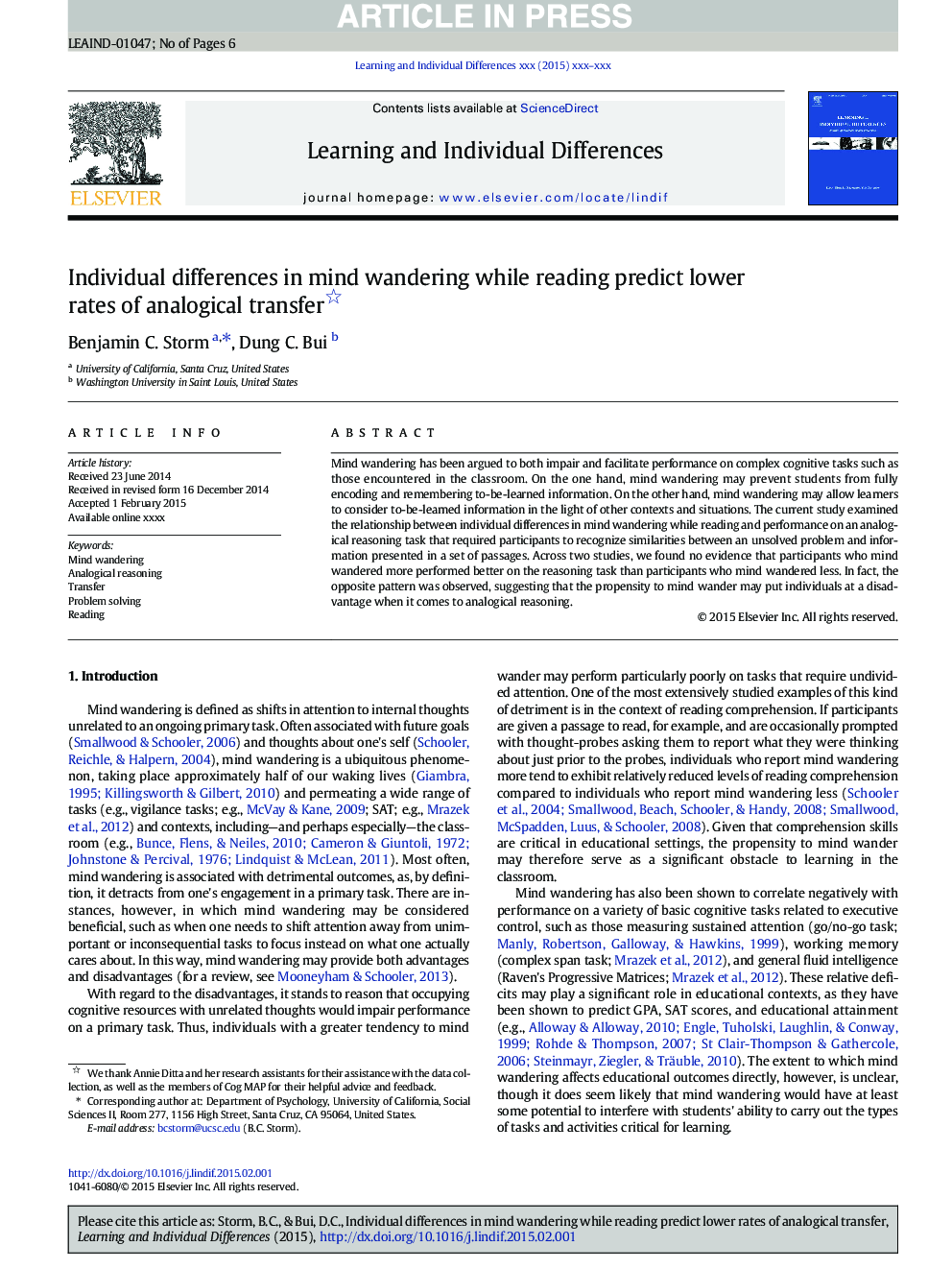| کد مقاله | کد نشریه | سال انتشار | مقاله انگلیسی | نسخه تمام متن |
|---|---|---|---|---|
| 4940142 | 1436372 | 2016 | 6 صفحه PDF | دانلود رایگان |
عنوان انگلیسی مقاله ISI
Individual differences in mind wandering while reading predict lower rates of analogical transfer
ترجمه فارسی عنوان
تفاوت های فردی در ذهن سرگردان در حالی که خواندن پیش بینی نرخ های پایین تر از انتقال آنالوگ
دانلود مقاله + سفارش ترجمه
دانلود مقاله ISI انگلیسی
رایگان برای ایرانیان
کلمات کلیدی
گیج کننده، استدلال آنالوگ، منتقل کردن، حل مسئله، خواندن،
ترجمه چکیده
ذهن سرگردان استدلال شده است که هر دو به شکست و تسهیل عملکرد در وظایف شناختی پیچیده مانند کسانی که در کلاس درس مواجه شده است. از یک طرف، ذهن سرگردان ممکن است دانشجویان را از تکثیر و به یاد آوردن اطلاعات به یادگیری جلوگیری کند. از سوی دیگر، ذهن سرگردان ممکن است به آموزگاران اجازه دهد که اطلاعات را به صورت یادگیرنده در نظر بگیرند و در شرایط دیگر و شرایط دیگر. در پژوهش حاضر رابطه بین تفاوت های فردی در ذهن سرگردان در حالی که خواندن و عملکرد در یک کار استدلال مشابهی مورد بررسی قرار گرفت که نیاز به شرکت کنندگان برای تشخیص شباهت بین یک مشکل حل نشده و اطلاعات ارائه شده در مجموعه ای از آثار. در دو مطالعه، هیچ شواهدی یافتیم که شرکت کنندگان که ذهن را سرگردان می کردند بیشتر در کار استدلال بهتر عمل می کردند نسبت به شرکت کنندگان که ذهن سرگردان کمتر بودند. در حقیقت، الگوی مخالف مشاهده شد، نشان می دهد که تمایل به ذهن سرگردان می تواند افراد را در معرض دشواری قرار دهد، زمانی که آن را به استدلال های مشابه می آید.
موضوعات مرتبط
علوم انسانی و اجتماعی
روانشناسی
روانشناسی رشد و آموزشی
چکیده انگلیسی
Mind wandering has been argued to both impair and facilitate performance on complex cognitive tasks such as those encountered in the classroom. On the one hand, mind wandering may prevent students from fully encoding and remembering to-be-learned information. On the other hand, mind wandering may allow learners to consider to-be-learned information in the light of other contexts and situations. The current study examined the relationship between individual differences in mind wandering while reading and performance on an analogical reasoning task that required participants to recognize similarities between an unsolved problem and information presented in a set of passages. Across two studies, we found no evidence that participants who mind wandered more performed better on the reasoning task than participants who mind wandered less. In fact, the opposite pattern was observed, suggesting that the propensity to mind wander may put individuals at a disadvantage when it comes to analogical reasoning.
ناشر
Database: Elsevier - ScienceDirect (ساینس دایرکت)
Journal: Learning and Individual Differences - Volume 51, October 2016, Pages 427-432
Journal: Learning and Individual Differences - Volume 51, October 2016, Pages 427-432
نویسندگان
Benjamin C. Storm, Dung C. Bui,
